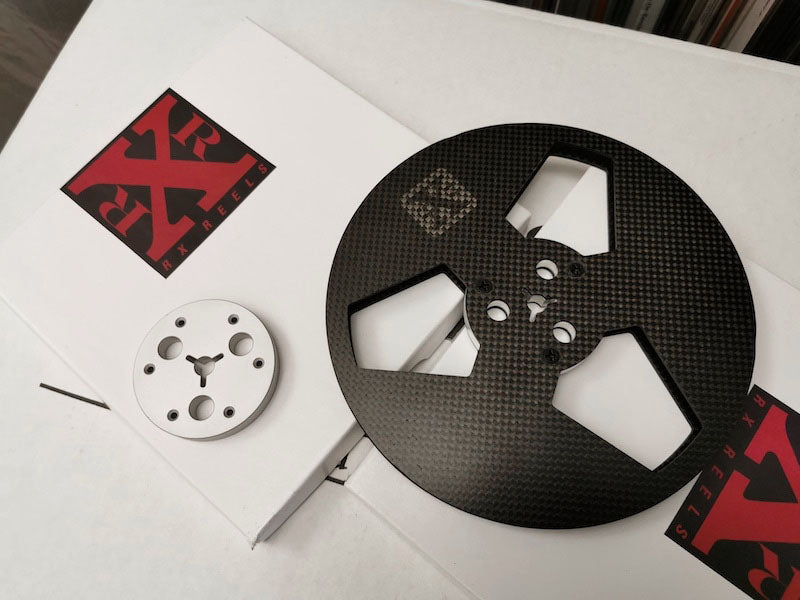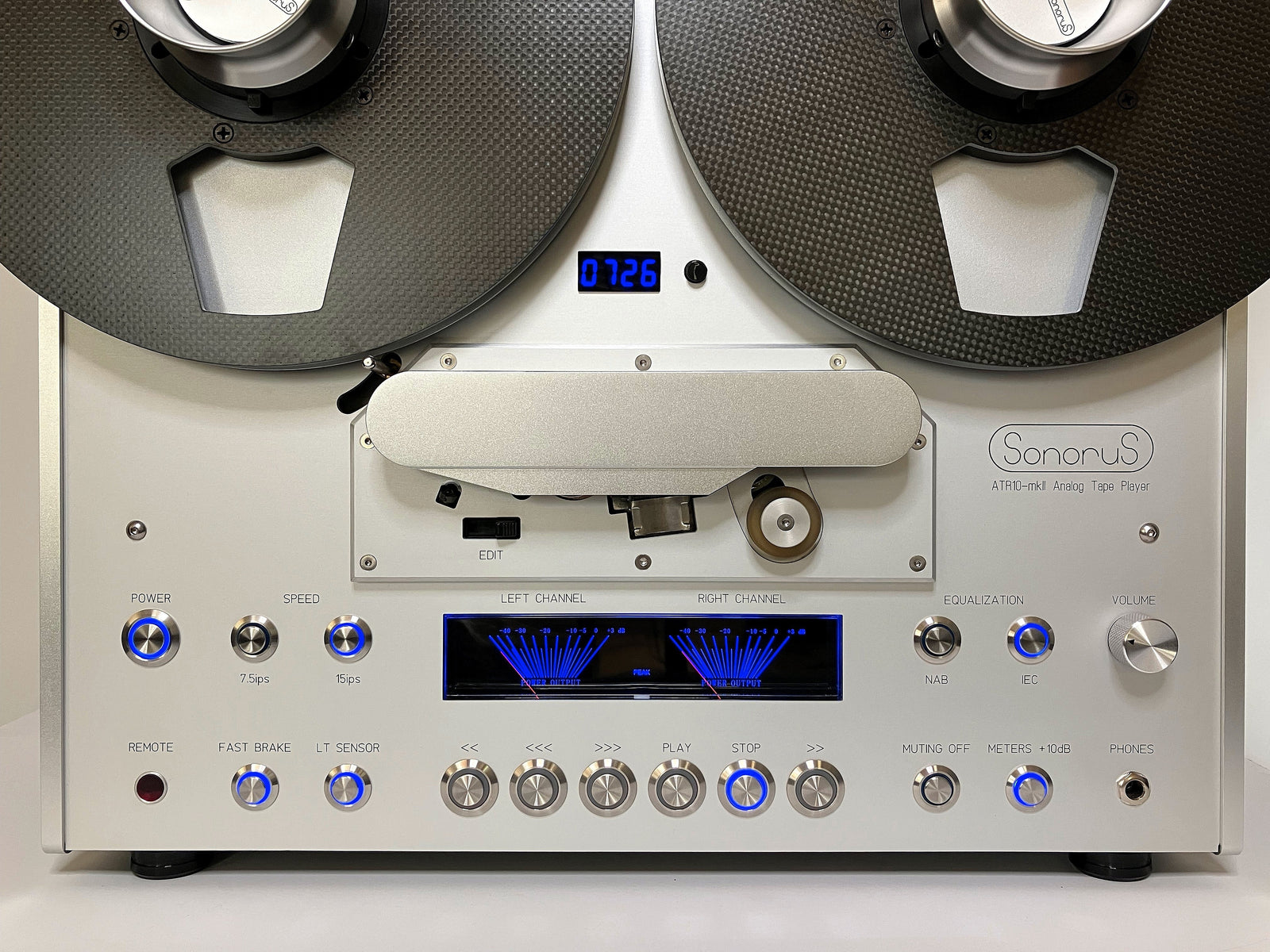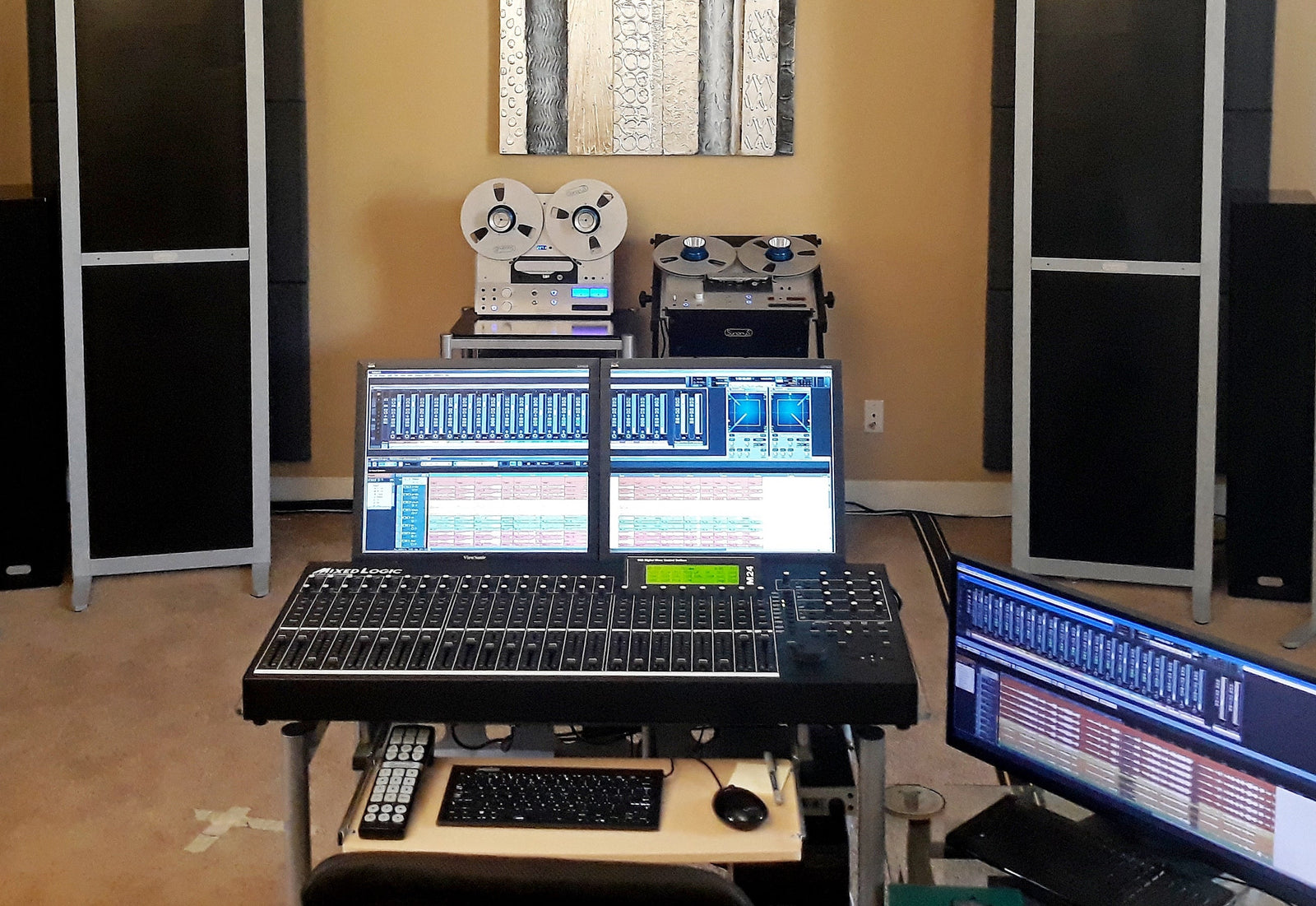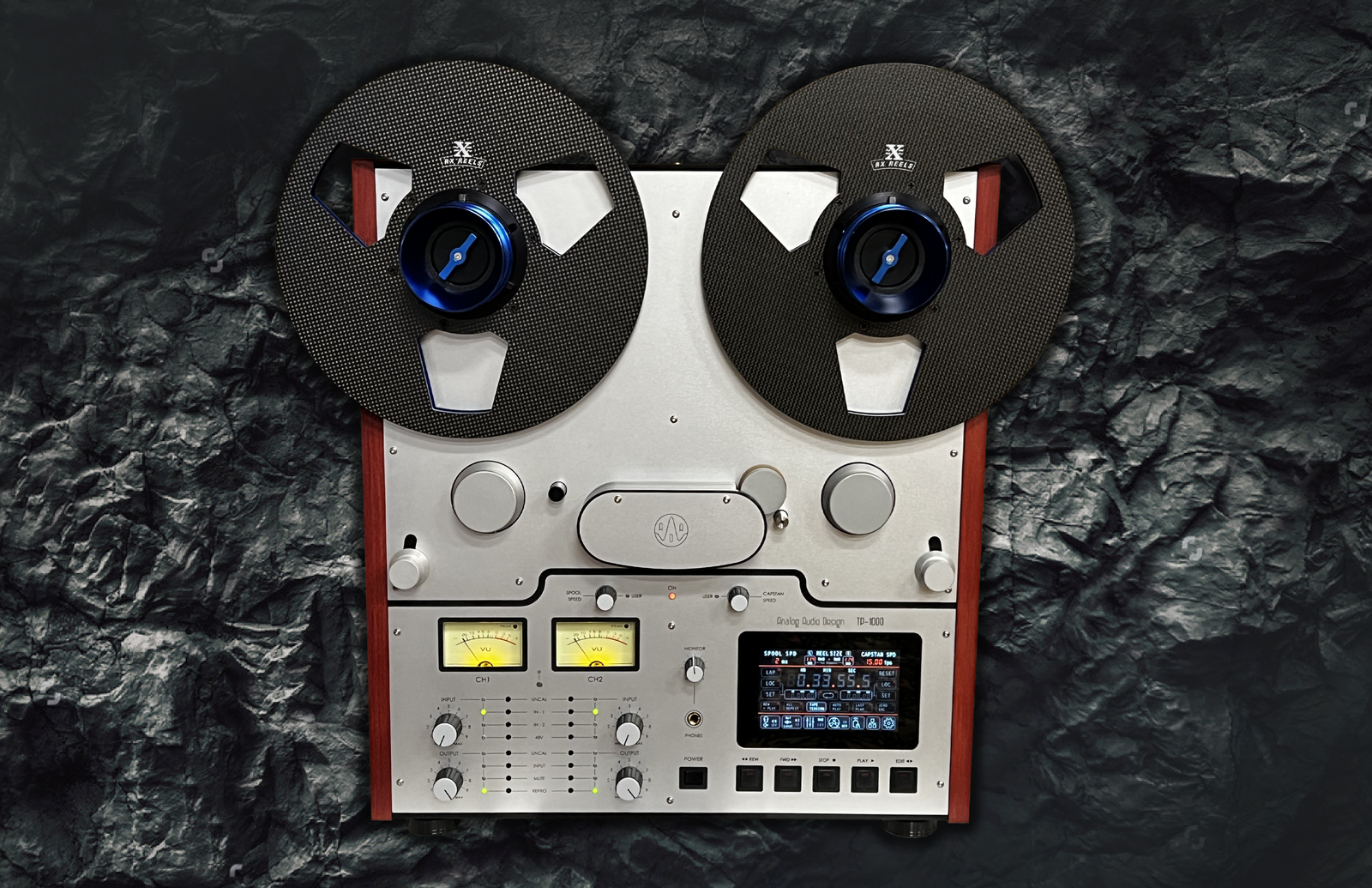Your Cart is Empty

To noodge is Yiddish for “to pester,” but with a vengeance. It isn’t just whining and nagging. It’s full-blown, incessant, won’t-take-no-for-an-answer annoyance. That’s how I managed to drive RX Reels’ Kevin Root into producing a 7-inch tape spool for those of us who spend more time using the smaller size than the hey-look-at-me 10-inch sort. Therefore, this issue’s installment demands full disclosure, because this is something of a self-back-patting-fest for me. I must take the blame or the credit for the arrival of a brand-new open-reel tape accessory.
Looking for a great player? See Our Ultimate Guide to Reel to Reel Players

Image above: RX Reels’ prototype 7-inch carbon fiber reel
Along with precious few other new concerns dealing with the niche that is the open-reel tape revival, e.g., the firms refurbishing old machines, Root’s RX Reels (www.rxreels.com) arose because Kevin is a tape devotee, recently returned to the fold, who decided that spools needed updating to 21st century specifications. He responded with his now-established carbon-fiber 10.5-inch of peerless precision and undeniable beauty, if you are the sort who finds esthetic splendor in mechanical devices. As I do of Robot Royal cameras, Crown 800-series tape decks, and anything automotive that says “Bugatti” pre-1957.
At $239 a pop, the spool certainly qualifies as a “luxury” purchase, and I am aware that RX Reels is not the only purveyor of new spools circa 2022. Indeed, the custom spools made for STS Digital are also things of beauty, available as empty reels, and I am aware of others from Germany. Now that I have gotten that bit of journalistic balance out of the way, first, I must say that I have never seen any spools built like the RX spools, nor did I expect to see performance gains of the level which both the 10.5-inch and now the 7-inch delivered.
Yes, I did say performance gains. I always thought that spooling evenness and consistency were the by-product of the tape deck, and the nine machines in my possession do vary one from the other. As examples, the Pioneer RT-707 is better than the TEAC X-3, the Nagra IV-S is smoother than the Technics RS-1500, and so on, while the aged Revox G36 continues to astound me for its tape handling after 60 years. But it wasn’t until Kevin visited me with the prototypes of the 7-inch spool that he and I and a colleague witnessed the miracle which their precision afforded.
Backing up to the “why” of my pleas, I nagged Root for two reasons, one of which is wholly solipsistic: I listen almost exclusively to tape on 7-inch spools, which outnumber my 10-inch tapes by 40-to-1. That’s because my only interest is in commercial, pre-recorded tapes from the format’s original span – circa-1953-to-circa-1985 – whereas I appreciate that most current hard-core reel-to-reel enthusiasts prefer to run 15 ips 2-track tapes which demand the real estate of a 10-inch spool if you want to play anything for more than 15 minutes.

Image above: Kevin Root (left) with Ken Kessler and both sizes of RX Reels carbon fiber spools.
As for the second reason, I thought 7-inch spools were a natural follow-up to his 10-inch spools (of which hundreds have been sold), I suspect that, for newcomers to tape, and judging by what I see selling on eBay and at flea markets, 7-inch-only machines probably outnumber the larger decks. There are thousands of salvageable Sony TC-377s and Akai 4000Ds out there, as well as Nagra IV-S machines unless you’re lucky enough to own the 10-inch spool adaptor. Also pertinent is that a spool of 7-inch blank tape costs substantially less than a 10-inch blank. Above all, for pre-recorded tapes, those used tapes from the era cited above are a lot cheaper than the current 10-inch, 15ips, 2-track offerings from the specialist labels.
It was with this logic that I browbeat Kevin into designing a 7-inch version of his existing spool – literally a scaling down in size, including the shape of the apertures in the flanges. Unfortunately, costs do not scale down, and his 10-inch spools are not inexpensive at $239, so he made wise compromises to add some affordability to a 7-inch version: there will not be a range of colors nor custom finishes, and the logo will be a sticker rather than an engraving. If he succeeds in keeping costs down, it is hoped that the 7-inch spools will be offered for $179 – $189, but don’t hold me to that.
After some months discussing the design with me and others, Kevin agreed that they should look exactly like the gray-finished 10-inch spool. He chose to dispense with any notch near the hub to accept leader or tail to make threading easier because he wanted the balance (evenness of weight distribution) to be unaffected, even by that small amount. He insisted on all-aluminum hubs, with three screws per side (six total) holding the flange to the hub.
Unfortunately, I threw him a curveball when I pointed out that decks of a certain vintage – including my cherished Denon DH-710F – employed a locating peg that requires a hole that is approximately 1/2-inch from the primary spindle. This is not necessary with the NAB hubs of the 10-inch spools because every NAB hub adaptor I’ve seen has the requisite aperture on its back to accept a locating peg.
This is accounted for, too, on every plastic spool I have ever seen, usually with a series of equidistant holes, or the positioning of the aperture for the tape threading. Kevin opted instead, in order to maintain ultimate balance, to design a hub with three equidistant holes.
He arrived with two prototype spools and a hub on its own, and the workmanship was as fine as anything I have seen in machined metal. And cynics please note: the RX spools are made entirely in the US. Even the carbon fiber has a tale to tell: it is truly aviation-grade, as well as enjoying green credentials because Root has found a source for offcuts from an airplane manufacturer, so recycling is part of the process.

Image above: the machined hub
As “offcuts” suggest to me scraps on the floor of a tailoring establishment, or odd-sized chunks of wood as might be created by a carpenter, Kevin had to laugh. “Ken,’” he said, “these are remnants from carbon fiber sheets needed to cover whole wings. You could hide behind them.”
Alas, I didn’t bother to measure the thickness of the flanges on the prototype 7-inch spools, but I suspect they are slightly thinner than the 2.3mm thick flanges of the 10-inch spools. Other than that, the new spools actually do resemble a scaled-down version of the larger reel in every way, aside from the obvious replacement of an aperture for a NAB hub with the smaller “Mercedes-Benz” three-prong standard to suit all spindles.
We played a variety of tapes on three completely different machines, including the Technics RS-1500, Denon DH-710F and a recently-acquired and completely refurbished Revox A77 Mk IV Dolby. Whether played in real-time at different speeds, fast-forwarded or rewound, the spooling was improved over that of the metal reels I had been using before. And we only paid attention to the spooling on metal, not onto plastic spools, though some of those are superb, e.g., Ampex’s reels.

Image above: RX Reels’ prototype 7-inch carbon fiber reel on the Revox A77 Mk IV.
This is not the place to savage the thin-aluminum-flange junk which was branded for tape decks back in the day. In many cases, they were worse than the plastic spools which came with either pre-recorded tapes or blanks from Maxell, TDK, etc. The only ones I care to praise are the 7-inch spools provided with the Pioneer RT-707, and an obscure but incredibly robust Ferrograph spool. Alas, this has screw heads near the center which are not flush with the flanges, so they only work on tape decks with undersized hub plates. Unless you’re handy with metalworking.
We were staggered. Running a finger over the spooled tape reveals no unevenness, no ridges. It made me think of (and I compared them to) fresh blank tape as it arrived from the factory. For this alone, anyone who uses 7-inch spools on a regular basis should purchase at least one for critical playback of treasured tapes. As for improvements to the sound? Hard to tell, as the sound was so amazing from the start.
Lastly, and this will appeal to all of you who surreptitiously switch off the lights in your listening room from time to time just to see how your system looks when fired up in the dark: the RX Reels look fantastic. Given the number of overdressed, pimped, decorated-within-an-inch-of-their-lives luxury open-reel tape decks that appear on Instagram and Pinterest, I am also prepared to disclose that, yes, looks do matter. Even with the lights out.
View original article of the RX Reels pre-production 7" reels here.
See RX Reels Carbon Fiber 10.5" and 7" reels here.
You Might Also Enjoy: Part Two: Ken Kessler's Review of RX Reels 7" Production Reel


This post delves into the topic of making enhancements to the actual recorded media on reel-to-reel tape. Numerous vinyl albums have been remastered, and indeed, several hundred tapes have undergone remastering from the master or near-master. These offer notable improvements in sound quality compared to the original recordings. Sonorus Audio offers a Holographic Imaging tape remastering service explored here.

Analog Audio Design's first product, the TP-1000 is wholly constructed from new components, utilizing technologies such as computer-aided design and advanced testing tools to augment tape transport and minimize distortion.
The all important heads are from AM Belgium, the same company that inherited the head technical specs directly from Studer / ReVox when they shut down.
The TP-1000 stands out as a three-motor machine using DC motors, all uniquely coupled by a belt and a flywheel to a modern design. Why? To reducing the cogging and flutter commonly associated with DC motors.